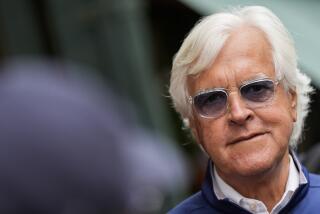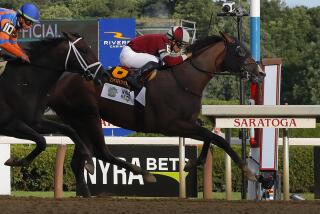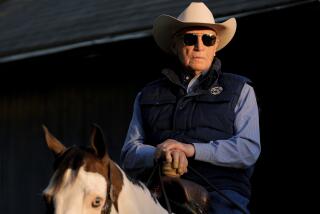Ira ‘Babe’ Hanford dies at 91; oldest Kentucky Derby-winning jockey
Ira “Babe” Hanford, who as an 18-year-old apprentice jockey rode 20-1 shot Bold Venture to victory in the 1936 Kentucky Derby, died Saturday in Ocala, Fla., after a long illness, said his wife of 67 years, Virginia. He was 91.
He was the oldest living jockey to have won the Derby and the only apprentice to have done so.
Hanford did not get a chance to ride Bold Venture in the Preakness because racing officials suspended him for 15 days after the Derby. He retired in 1953 without running in another Derby. He is one of 22 jockeys to win the Run for the Roses in their only appearance.
Hanford said officials never told him why he was suspended, along with two other jockeys. He said in a 2006 interview that he suspected it had to do with the rugged nature of the sport at the time.
Back then, the starting gate didn’t have front or rear doors to lock the horses in a somewhat uniform line. They were led in and stood there until a bell rang.
Hanford looked to his right and saw Bien Joli standing at an angle and about a neck in front of him and Bold Venture. He called out to jockey Lester Balaski to straighten his horse.
“I didn’t get ‘horse’ out of the mouth and the bell rang,” said Hanford, who as an apprentice got to carry less weight than senior riders. “When he made the first or second jump out of the gate, he hit me and turned me almost sideways.”
Hanford and Bold Venture careened to the left and into Granville, knocking jockey Jimmy Stout to the ground.
Bold Venture’s trainer, Max Hirsch, replaced Hanford with George Woolfe for the Preakness, which the horse won. Bold Venture did not run in the Belmont.
A Nebraska native, Hanford was called Babe because he was the youngest of 10 children. An older brother, Carl, trained Kelso, a five-time horse of the year.
Hanford left home at age 16 to become an exercise rider. Mainly riding on the East Coast while a jockey, he got three chances on Seabiscuit in 1936.
During World War II, he broke mules for Army pack-animal duty while stationed in Nebraska.
He ended his jockey career in 1953 and became a trainer in Florida.
More to Read
Start your day right
Sign up for Essential California for the L.A. Times biggest news, features and recommendations in your inbox six days a week.
You may occasionally receive promotional content from the Los Angeles Times.






